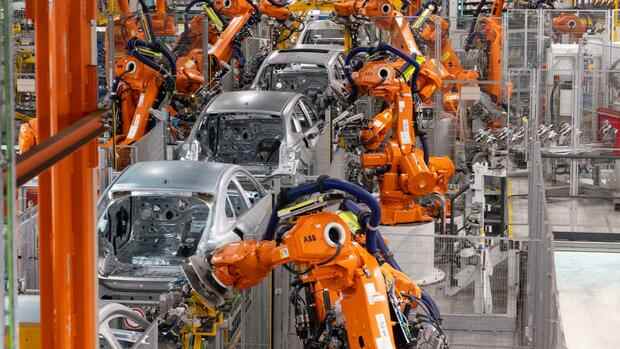Munich BMW’s two most important production sites in Germany have been at a standstill since March 7th. In Munich and Dingolfing, the group lacks cable harnesses from the Ukraine, and the lines are only supposed to run normally again from next week. These “restrictions” as a result of the Russian war of aggression weigh on BMW’s business. And so much so that the group is now dampening its outlook.
Without the negative war effects on their own supply chain, the people of Munich would have expected slightly increasing vehicle sales for 2022. The forecast now speaks of stagnant sales. “Due to the foreseeable adjustments in production, deliveries are expected to be at the previous year’s level,” BMW said on Wednesday.
Worse still, the operating margin at the dominant auto division is likely to shrink this year. While the Bavarians were able to score last year with a margin of 10.3 percent, the company now only expects a profit margin of between seven and nine percent. “Without the influence of the war in Ukraine, the BMW Group would have aimed for a corridor of eight to ten percent,” emphasized the Dax group.
According to BMW, it is in intensive contact with its suppliers in order to keep production losses as a result of the geopolitical situation as low as possible. However, the group expects that there will be further restrictions in the coming weeks. Not least because the Munich-based company continues to source components from western Ukraine and thus wants to offer the employees of local suppliers long-term prospects.
Top jobs of the day
Find the best jobs now and
be notified by email.
Overall, however, BMW is promising its shareholders increasing sales and profits for 2022. The reason: This year the group can fully consolidate the results from its joint venture with the Chinese partner Brilliance in its own balance sheet for the first time. BMW was the first German carmaker to take over the majority of its joint venture in the People’s Republic for 3.7 billion euros and now holds 75 percent of the shares.
Longer-term effects of the Ukraine war are “unpredictable” for BMW
A scenario in which the prices for primary products could increase significantly again as a result of the Ukraine war and stricter sanctions against Russia is explicitly not taken into account in the BMW forecast. The situation is “extremely dynamic,” explains BMW. Possible long-term effects of the war in Ukraine are currently “unpredictable”.
BMW boss Oliver Zipse said on Wednesday: “In the current situation, three things are elementary for the BMW Group: to help the victims and those affected where we can, to secure our global day-to-day operations and to continue to implement our long-term strategy consistently.”
Despite the corona crisis and a lack of chips, the people of Munich can look back on a record year. The bottom line is that BMW more than tripled its profit in 2021 to 12.5 billion euros. Sales rose by around eight percent. BMW sold a good 2.5 million vehicles – more than ever before. As a result, sales rose to 111 billion euros. This corresponds to an increase of around twelve percent.
On the basis of this strong balance sheet, BMW now wants to accelerate the technological change towards electric drives and digital cockpits. The group wants to create more than 5,000 new jobs for this. BMW has cut a good 16,000 full-time jobs since 2018. The group currently employs around 119,000 people worldwide.
With new specialists, BMW now wants to push its electric offensive, among other things. Specifically, the Munich-based company wants to have more than two million fully electric vehicles on the road by the end of 2025. By the end of the decade, sales of BMW electric vehicles should already be more than ten million units.
“New class” ensures electric euphoria
The proportion of purely electric new cars from BMW could thus be more than half of total sales well before 2030. In other words, BMW aims to deliver more than 1.5 million fully electric cars to customers per year by the end of the decade. So far, Bayern have been a bit more pessimistic here.
The reason for the new electro euphoria in Munich is the so-called “New Class”. This is what BMW is calling its new model generation starting in 2025, which for the first time is based on a platform uncompromisingly designed for electric cars. BMW promises a “big leap in technology”. In the vehicles of the “New Class”, for example, a completely new electric drive and optimized cell chemistry are to be used in the batteries. This should increase the range noticeably while reducing consumption and costs.
BMW plans to announce details of the new battery technology this year. Rivals such as Tesla, Volkswagen and Mercedes-Benz had aroused strong interest among investors with events in recent years. So far, BMW has not been considered a pioneer when it comes to purely battery-electric vehicles. The carmaker still assumes that conventional drives such as combustion engines will still be necessary in some regions of the world after 2030.
More: “BMW will regret it” – Investors consider planned share buybacks to be a waste of money
